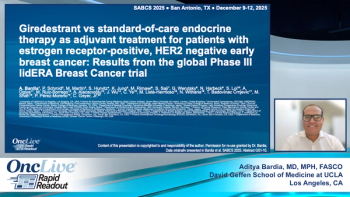
|Videos|March 15, 2022
Patient-Reported Outcomes and Changes in PSA in Patients With Advanced Prostate Cancer Treated With Apalutamide in the SPARTAN and TITAN Studies
Expert urologist Benjamin Lowentritt, MD, reviews advanced prostate cancer data from the SPARTAN and TITAN studies comparing patient-reported outcomes to changes in PSA.
Advertisement
Transcript:
Background
- In phase 3 placebo-controlled trials using androgen deprivation therapy (ADT), the addition of apalutamide in patients with nonmetastatic castration-resistant prostate cancer (nmCRPC) and metastatic castration-sensitive prostate cancer (mCRPC) resulted in the following:
- Improved overall survival
- Reduced risk of disease progression
- Preserved health-related quality of life
- In many patients, prostate-specific antigen (PSA) responses were rapid and deep, with reduction to 0.2 ng/mL or less or 90% or greater reduction compared with baseline.
- Reduction was associated with extended metastasis-free survival or radiographic progression-free survival.
- The objective of this post hoc analysis of the SPARTAN (NCT01946204) and TITAN (NCT02489318) trials was to explore the relationship between rapid and deep PSA decline with health-related quality of life following apalutamide treatment.
Methods
- Patients were randomized to 28-day cycles of apalutamide 240 mg every day or placebo.
- Patient-reported outcomes were assessed at baseline, specific cycles during treatment, and postprogression up to 1 year via paper or electronic surveys.
- A month 3 landmark analysis and a month 6 landmark analysis evaluated PSA decline and time to subsequent deterioration in patient-reported outcomes.
- Time-to-event end points were analyzed by Kaplan-Meier method and Cox proportional hazards model
Results and Conclusions
- At months 3 and 6, PSA decline correlated with health-related quality of life measures.
- Patients with advanced prostate cancer who had rapid and deep declines in PSA following treatment with apalutamide had more favorable health-related quality of life, physical wellbeing, and less pain and fatigue.
- These data show that early PSA response indicates benefits in patient-relevant end points in conjunction with oncological outcomes.
- These data may help guide care and counsel for patients with nmCRPC or mCSPC.
Advertisement
Latest CME
Advertisement
Advertisement
Trending on OncLive
1
Single-Center, Retrospective Data Show Low Rate of Lifileucel Infusion Following Referral in Advanced Melanoma
2
Real-World Data Support Clinical Benefit With Lifileucel in Previously Treated Advanced Melanoma
3
Outcomes With Bridging Therapy Correlate With Cilta-Cel Efficacy, Safety in Multiple Myeloma
4
Long-Term Cilta-Cel Data Show Low Rates of PFS Events in Standard-Risk R/R Myeloma
5






































